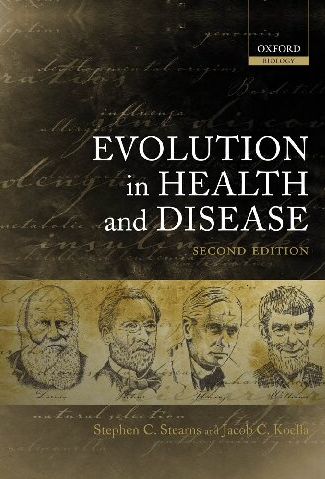Evolution in Health and Disease 2nd Edition by Stephen C. Stearns, ISBN-13: 978-0199207466
[PDF eBook eTextbook]
- Publisher: Oxford University Press; 2nd edition (January 10, 2008)
- Language: English
- 368 pages
- ISBN-10: 0199207461
- ISBN-13: 978-0199207466
In this fully revised and updated edition, the editors have integrated a completely new set of contributions from the leading researchers in the field to describe the latest research in evolutionary medicine, providing a fresh summary of this rapidly expanding field 10 years after its predecessor was first compiled. It continues to adopt a broad approach to the subject, drawing on medically relevant research from evolutionary genetics, human behavioral ecology, evolutionary microbiology (especially experimental evolution of virulence and resistance), the evolution of aging and degenerative disease, and other aspects of biology or medicine where evolutionary approaches make important contributions.
Evolution in Health and Disease describes how evolutionary thinking gives valuable insights and fresh perspectives into human health and disease, establishing evolutionary biology as an essential complementary science for medicine. Integrating evolutionary thought into medical research and practice helps to explain the origins of many medical conditions, including diabetes, obesity, cardiovascular disease, asthma, allergies, other autoimmune diseases, and aging. It also provides life-saving insights into the evolutionary responses of pathogens to antibiotics, vaccinations, and other human interventions. Why do we grow old? How can we stay healthy as we age? The book discusses these and many other fascinating questions, as well as suggesting exciting possibilities for future treatment and research.
This research level text is suitable for graduate level students and researchers in the fields of evolutionary (Darwinian) medicine, evolutionary biology, anthropology, developmental biology and genetics. It will also be of relevance and use to medical researchers and doctors.
Table of Contents:
Preface
Part I. Introduction
Chapter 1. Introducing evolutionary thinking for medicine, by Stephen C. Stearns, Randolph M. Nesse, and David Haig
Part II. The history and variation of human genes
Chapter 2. Global spatial patterns of infectious diseases and human evolution, by Jean-François Guégan, Franck Prugnolle, and Frédéric Thomas
Chapter 3. Medically relevant variation in the human genome, by Diddahally R. Govindaraju and Lynn B. Jorde
Chapter 4. Health consequences of ecogenetic variation, by Michael Bamshad and Arno G. Motulsky
Chapter 5. Human genetic variation of medical significance by Kenneth K. Kidd and Judith R. Kidd
Part III. Natural selection and evolutionary conflicts
Chapter 6. Intimate relations: evolutionary conflicts of pregnancy and childhood, by David Haig
Chapter 7. How hormones mediate tradeoffs in human health and disease, by Richard G. Bribiescas and Peter T. Ellison
Chapter 8. Functional significance of MHC variation in mate choice, reproductive outcome, and disease risk, by Dagan A. Loisel, Susan C. Alberts, and Carole Ober
Chapter 9. Perspectives on human health and disease from evolutionary and behavioral ecology, by Beverly I. Strassmann and Ruth Mace
Part IV. Pathogens: resistance, virulence, variation, and emergence
Chapter 10. The ecology and evolution of antibiotic resistant bacteria, by Carl T. Bergstrom and Michael Feldgarden
Chapter 11. Pathogen evolution in a vaccinated world, by Andrew F. Read and Margaret J. Mackinnon
Chapter 12. The evolution and expression of virulence, by Dieter Ebert and James J. Bull
Chapter 13. Evolutionary origins of diversity in human viruses, by Paul M. Sharp, Elizabeth Bailes, and Louise V. Wain
Chapter 14. The population structure of pathogenic bacteria, by Daniel Dykhuizen and Awdhesh Kalia
Chapter 15. Whole-genome analysis of pathogen evolution, by Julian Parkhill
Chapter 16. Emergence of new infectious diseases, by Mark Woolhouse and Rustom Antia
Chapter 17. Evolution of parasites, by Jacob C. Koella and Paul Turner
Part V. Noninfectious and degenerative disease
Chapter 18. Evolutionary biology as a foundation for studying aging and aging-related disease, by Martin Ackermann and Scott D. Pletcher
Chapter 19. Evolution, developmental plasticity, and metabolic disease, by Christopher W. Kuzawa, Peter D. Gluckman, Mark A. Hanson, and Alan S. Beedle
Chapter 20. Lifestyle, diet, and disease: comparative perspectives on the determinants of chronic health risks, by William R. Leonard
Chapter 21. Cancer: evolutionary origins of vulnerability, by Mel Greaves
Chapter 22. Cancer as a microevolutionary process, by Natalia L. Komarova and Dominik Wodarz
Chapter 23. The evolutionary context of human aging and degenerative disease, by Steven N. Austad and Caleb E. Finch
References
Index
What makes us different?
• Instant Download
• Always Competitive Pricing
• 100% Privacy
• FREE Sample Available
• 24-7 LIVE Customer Support






Reviews
There are no reviews yet.